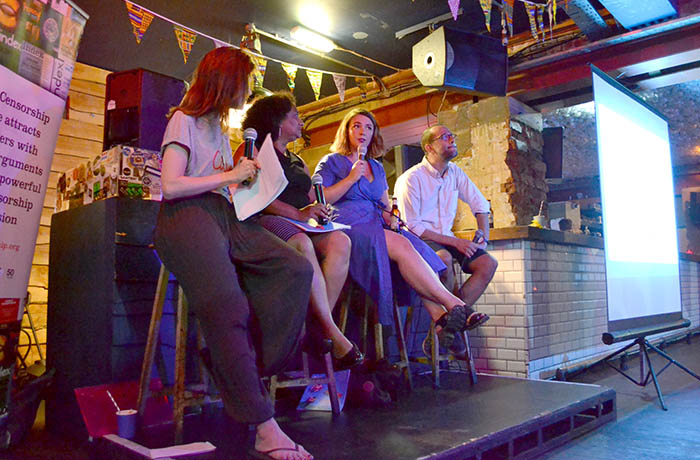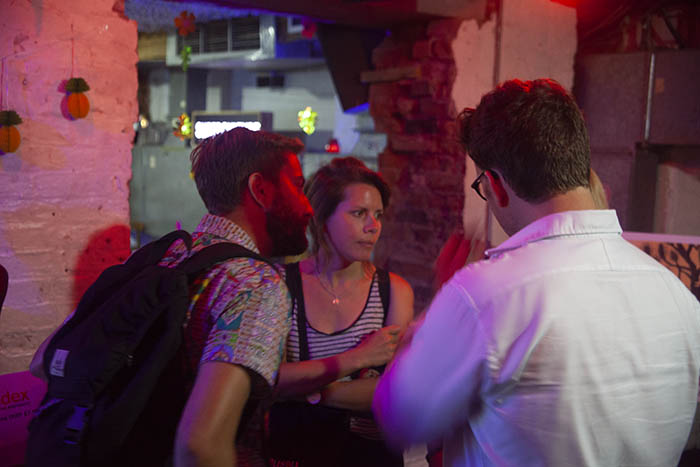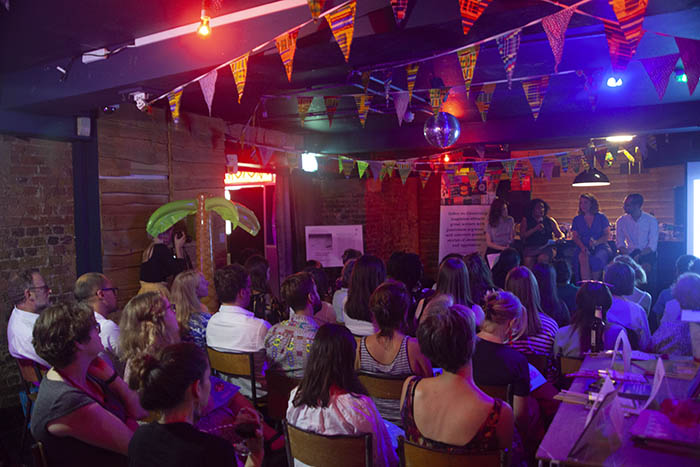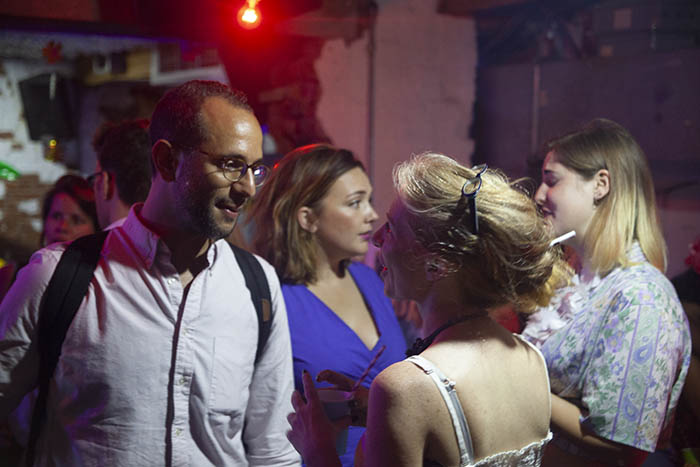[vc_row][vc_column][vc_column_text]

Vicky Baker, Meera Selva, Harriet Fitch Little and Benji Lanyado. Credit: Rosie Gilbey
“I would always err towards saying go rather than don’t go,” said Benji Lanyado, travel writer and founder of picture agency Picfair, speaking at a panel debate to launch the summer 2018 issue of Index on Censorship magazine.
The latest issue of the magazine, Trouble in Paradise, looks at the free speech issues that are prominent in certain top travel destinations, and yet are often overlooked by tourists and the tourist industry. Countries covered included Mexico, Malta, the Philippines and the Maldives. For the launch, a panel of travel writers and editors shared their thoughts on the roles of writers to tell the full story, rather than the nice, PR holiday story, and discussed the free speech implications of travel.
Taking place at The Book Club in Shoreditch, London, Lanyado was joined by former foreign correspondent Meera Selva, and Harriet Fitch Little, a Financial Times writer. The discussion was chaired by Vicky Baker, a journalist at the BBC.
“The best travel writers do weave in the history and the politics of a place,” said Selva, while Fitch Little, talking about travel writing that might be paid for by travel companies or tourist boards as opposed to publications, said “there’s a way to write about a press trip that is fascinating and revealing.”
All panellists agreed on the value of speaking to locals in a destination, though they also acknowledged that doing so was not necessarily on the top of everyone’s holiday priority list, in particular families who might just want a nice break or might not have the budget for more adventurous travel – and that shouldn’t necessarily be condemned. “We all need escapism from time to time,” said Baker.
The panel also discussed whether travel journalists should write about problematic countries at all, raising questions about whether travelling to these places – and encouraging others to travel to them – benefits corrupt regimes.
“The best travel writers don’t just regurgitate the travel documents provided by the government,” Lanyado said.
“Sometimes you can get so obsessed by the pitfalls of a country and the leaders of a country that you forget about the people, and they can be totally different,” he added and asked whether boycotting a country was a form of censorship in its own right.
“If you don’t go, you don’t learn about the people,” said Baker.
Selva recalled a story of a travel journalist who went on a press trip to North Korea. While this journalist had first-hand experience of government propaganda, they also saw another side of the country when their bus driver did a detour into the countryside, heading off the beaten track. Had the travel journalist not gone, they would not have been able to report on this side.
The question of “ethical travel” was picked up by an audience member, Tina Urso from Malta, who spoke about Daphne Caruana Galizia, a Maltese journalist who was murdered on 16 October 2017 some 70 metres away from her home. Her death, which remains unsolved, exposed Malta’s dark side. There is now a memorial to Daphne opposite the central law courts in Valletta, the capital.
Urso said how this memorial is constantly dismantled, but that tourists, more so than locals, regularly rebuild it. She therefore saw the presence of tourists in Malta as playing a fundamental – and positive – role in highlighting these free speech abuses.
Finally, Fitch Little, who worked for local press in Lebanon and Cambodia, noted that there can sometimes be pressure coming from the other direction, namely pressure for writers to ham up the darker sides of destinations and that this too can conceal the real truth. She said how when writing about Cambodia, UK media often wanted a particular angle, usually one related to the Khmer Rouge.
Equally, when working for Time Out in Lebanon, her friends back home found it hard to believe that the country could have nice restaurants, for example, having seen the country in a more negative light. “Less sexy stories don’t get told,” she said.
For more information on the summer issue of the magazine, click here. Included in the issue is an article from a Maltese journalist, Caroline Muscat, on corruption in the country, a look at journalists living under protection due to their reporting of the drug wars in Baja California Sur and an interview with Federica Angeli, a journalist who lives under 24-hour police protection following her exposé of the mafia in the pretty Italian seaside resort of Ostia.
[/vc_column_text][/vc_column][/vc_row][vc_row][vc_column width=”1/3″][vc_custom_heading text=”Trouble in Paradise”][vc_column_text]The summer 2018 issue of Index on Censorship magazine takes you on holiday, just a different kind of holiday. From Malta to the Maldives, we explore how freedom of expression is under attack in dream destinations around the world.
With: Martin Rowson, Jon Savage, Jonathan Tel [/vc_column_text][/vc_column][vc_column width=”1/3″][vc_single_image image=”100843″ img_size=”medium”][/vc_column][vc_column width=”1/3″][vc_custom_heading text=”Subscribe”][vc_column_text]In print, online. In your mailbox, on your iPad.
Subscription options from £18 or just £1.49 in the App Store for a digital issue.
Every subscriber helps support Index on Censorship’s projects around the world.
![]() SUBSCRIBE NOW[/vc_column_text][/vc_column][/vc_row]
SUBSCRIBE NOW[/vc_column_text][/vc_column][/vc_row]







